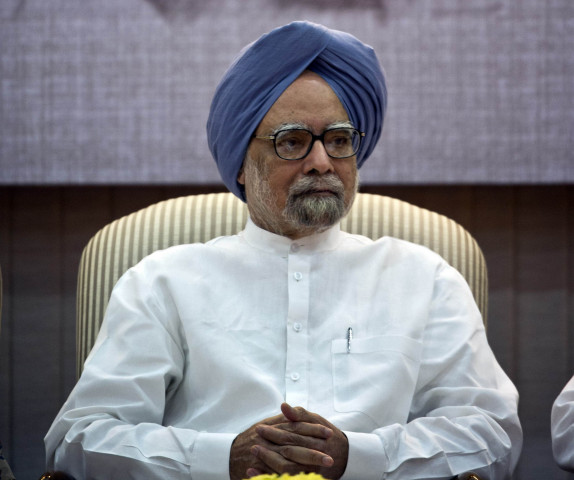Indian PM heads to Russia, China to boost trade
Singh will also seek a breakthrough on the border dispute with China that has soured ties for decades.

Indian Prime Minister Manmohan Singh. PHOTO: AFP
The 81-year-old, who is expected to stand down after elections next year, will look to clinch energy, defence and other economic deals in both countries as New Delhi tries to boost trade and investment to kick-start sluggish growth.
Singh will also seek a breakthrough on the border dispute with China that has soured ties for decades, after the leaders of the two Asian giants pledged earlier this year to build up trust.
"Maintenance of peace, tranquility and stability on our border is an important factor in our bilateral ties (with China) and it is expected that this would be an important aspect of the discussions," Indian Foreign Secretary Sujatha Singh said at a briefing Friday on the four-day trip.
Singh, who arrives in Moscow on Sunday night, will meet President Vladimir Putin the following day with the focus on strengthening supply of weapons and military hardware to New Delhi.
"Russia is a key partner for us in the field of defence," the foreign secretary said in New Delhi.
India, which is spending billions of dollars upgrading its military hardware, has been Russia's top arms customer for years, but relations have frayed over delays and cost-overruns.
Both countries will be looking to seal accords on the next phase of a Russian-built nuclear power project on India's southern coast. The project is designed to help meet India's surging demand for electricity, but has been dogged by delays and protests over safety.
Singh is expected to assure Moscow on concerns over legal liability in the event of an accident, crucial for the supply of Russian nuclear reactors to the plant, according to reports.
Singh will head to China on Tuesday looking to forge closer economic ties and ink an agreement to ease tension along their disputed border in a remote Himalayan region, following a flare-up in April.
India accused Chinese troops of intruding nearly 20 kilometres into Indian-claimed territory, triggering a three-week standoff that was resolved when troops from both sides pulled back.
China and India fought a brief war in 1962, and the border between the nuclear-armed neighbours has never been formally demarcated, although they have signed accords to maintain peace.
Singh and his Chinese counterpart Li Keqiang are to hold talks on Wednesday on the issue, after both pledged to resolve the dispute during Li's visit to India in May.
Officials from both countries are racing ahead of Singh's arrival to finalise the so-called border defence cooperation pact, which includes provisions for better communications between their armies.
China expert Srikanth Kondapalli told AFP, however, the pact only dealt with some of the issues of the complex dispute, which would continue to sour relations.
"There is no magic wand which will help him (Singh) walk away with a fruitful conclusion," said Kondapalli, head of East Asian Studies at Jawaharlal Nehru University in New Delhi.
Singh will also seek progress on closing the trade gap between the two countries, including through hiked Chinese investment by setting up Chinese industrial parks in India.
China is India's biggest trading partner, with two-way commerce totalling $67.83 billion last fiscal year, up from $2.1 billion in 2001-02.
But India's trade deficit with its neighbour soared to $40.77 billion last year from just $1.08 billion in 2001-02, Indian figures show.
Kondapalli said Singh, from the ruling Congress party, was under pressure to boost trade and lure foreign investment to help turn around the economy, which grew at a decade low last year.
"The economic growth of the country weighs heavily on the upcoming elections (due by May) and Congress is pretty dependent on reviving it in order to win," he said.



















COMMENTS
Comments are moderated and generally will be posted if they are on-topic and not abusive.
For more information, please see our Comments FAQ